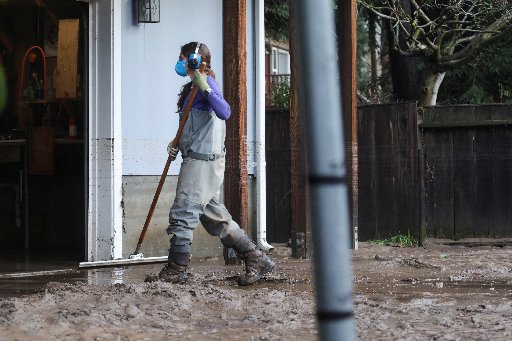OAKLAND, Calif. (OSV News) — Catholic organizations in California, strengthened by years of responding to disasters in the Golden State, responded quickly to bring aid to those affected by the ongoing brutal winter storms.
Since late December, a series of atmospheric rivers have brought record-setting rainfall to the state, leading to flooding, mudslides and evacuations. Nineteen people have died, while a 5-year-old boy remained missing after being swept away in a flash flood earlier in the week. One state official estimated the storms could cause more than $1 billion in damages, and more than two-thirds of California counties are eligible for federal emergency assistance.
California Gov. Gavin Newsom said Jan. 11 the state “is soaked and even an inch more of rain can bring catastrophic impacts like flooding and mudslides. These conditions are serious and they’re deadly, and we want all Californians to be mindful and follow all guidance from local emergency responders.”
In a statement, the California Catholic Conference offered prayers for “those who have lost their lives, those in flooded areas or who are at risk of flooding, for those who continue to be without power, and for emergency personnel who are working tirelessly to keep people safe.”
At Catholic Charities of the Diocese of Santa Rosa, in Northern California, the disaster response has been focused on safety check-ins, matching resources to those who need them, and bringing warm clothing, baby supplies and other items to local emergency shelters.
Years of disasters in the region, especially wildfires, have given Catholic Charities and other nonprofits critical experience in emergencies.
“During a disaster, the key is to have strong communication and collaboration with other nonprofits and state governments to get help quickly to those who need it,” John Pavik, communications director for Catholic Charities in Santa Rosa, told OSV News. “We’ve learned lessons with each previous disaster and are really seeing it come to the front now.”
Pavik emphasized that once the immediate crisis passes, Catholic Charities has case workers available to help people recover from the damage. “Disasters happen in a short time frame, but the impact is long term,” he said.
For Judy Dietlein, a member of the Society of St. Vincent de Paul (SVdP) and the western region chair of its Disaster Services Corporation, what changes in a disaster is the scale of the assistance that is offered.
“SVdP conferences will respond to their community on every level they can, as they do day to day,” Dietlein said, adding that the local knowledge the parish-based conferences have makes them “very savvy” in connecting people to the resources they need.
Dietlein said conference members, who are all volunteers, are the “boots on the ground, who are doing the work, meeting people every day, and certainly a disaster never stopped them from helping anyone.”
The national Society of St. Vincent de Paul organization has provided Walmart gift cards and hygiene kits for people staying in shelters and given money to conferences to address other needs, especially blankets, food and gas. Case managers employed by St. Vincent de Paul also are available if a major disaster is declared by the federal government.
California’s homeless population, estimated at more than 170,000, is particularly vulnerable to the effects of the weather, and at least three unhoused Californians have died due to storm-related accidents.
San Francisco’s St. Anthony Foundation has seen a significant increase in people visiting for daytime shelter, showers, and laundry services since the dangerous weather arrived. CEO Nils Behnke said about 50 more guests arrived each day than they had capacity for during the first week of January.
“It is a horrible disaster. If you just think about what many of us experience in our own buildings, it’s a nuisance compared to if you sleep on the street, where it becomes dangerous and difficult. It makes living unhoused a lot harder,” Behnke said.
In response, the nonprofit has extended hours for programs, handed out ponchos and set up tents to keep belongings dry.
Two more storms are forecast to hit California before the weather possibly subsides next week.

